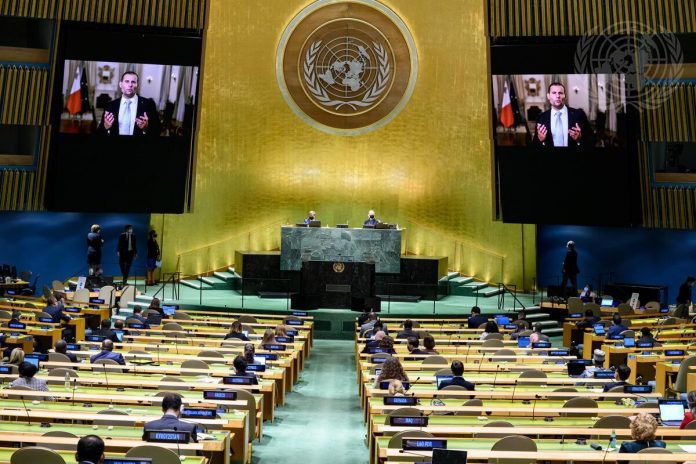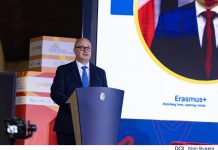During his address to the 76th meeting of the United Nations General Assembly, Prime Minister Robert Abela emphasised that multilateralism is the key to a strong and sustainable future. Dr Abela urged world leaders to come together and forge ahead with plans that demonstrate determination and commitment to a strong recovery from the COVID-19 pandemic that leads to a more equal, inclusive, resilient, and sustainable world.
The Prime Minister stated that a significant push at the highest political level is needed to reverse some of the effects of the pandemic, avoid a global recession, and get back on track to fulfil the 2030 Agenda for Sustainable Development within this Decade of Action and Delivery.
Prime Minister Abela pledged his support to an inclusive and resilient post-pandemic recovery that is based on an open and rules-based approach to international trade and foreign direct investment:
“Action should be focused on ensuring the proper implementation of existing rules, as well as the negotiation and implementation of new rules on issues that have emerged over the years. Fair competition should be at the heart of any approach for a post-pandemic economic recovery.”
On climate change, Prime Minister Abela said it is one of the global challenges that world leaders have to address, and action has to be taken before it is too late. Malta is committed to ensuring that the voices of those states mostly affected by the impacts of climate change are heard and has been actively and continuously working within the relevant UN structures and with the other member states to raise awareness on the needs and capabilities of these countries.
As a founding member of the Alliance of Small Island Developing States, Malta’s goal is to become a leader in Small Island State Governance, standing ready to share the country’s plans on decarbonisation and digitalisation. The small island states face challenges regarding their critical infrastructure, but in parallel, can also demonstrate how effective the community-based approach is.
The Prime Minister highlighted that achieving carbon neutrality is one of the five major pillars of Malta’s economic vision for 2030 and that despite the severe economic impact COVID-19 has had upon national finances, Malta’s programme for an ambitious decarbonisation programme has not waivered.
In his address, Prime Minister Abela discussed Libya and stated that the future of the country’s future must remain at the forefront of the UN’s common agenda for international peace and stability. He said that the international community needs to provide support to the Libyan authorities, under the auspices of the United Nations, to make sure that the political transition is a successful one for the Libyan people, the region, the African continent, and the world.
The Prime Minister also touched upon the situation in the Middle East, Syria, and Afghanistan. Regarding Afghanistan, the Prime Minister stated his support to the words of the UN Secretary-General that the international community must unite and ensure that Afghanistan is never again used as a platform or haven for terrorist organisations.
Malta is ready to support the global effort and be an effective international change agent by assisting the alignment of economic strategies, promoting a collaborative international conversation, and drive technological innovation whilst remaining sensitive to societal and cultural implications.
“Malta stands united with the international community to build a better world, where understanding and cooperation are at the heart of our policies and the work we do on the ground. Where we work together in a unified and multilateral manner.”
“Peace and security are fundamental if we have any ambition to protect international humanitarian principles and minimise the impact of conflict on innocent civilians, including those who are the most vulnerable.”
Prime Minister Abela strongly encouraged the UN Council and the member states to support the full implementation of strong child protection mandates, including through the speedy deployment of senior child protection advisors and teams, and by prioritising the protection of children in peacekeeping transitions. Should Malta be entrusted to serve on the Security Council in 2023-2024, Prime Minister Abela said Children and Armed Conflict will be a key priority as this issue should be mainstreamed across the work of the Security Council.
If elected to the UN Security Council, Malta will also commit to supporting the UN as a neutral member state actively pursuing peace, security, and social progress among all nations across the world. Prime Minister Abela added that Malta will continue to stress the need to include women and youths in peacekeeping and peacebuilding efforts as their voices must be heard if we are to build fair and inclusive societies.
Photo (OPM)










